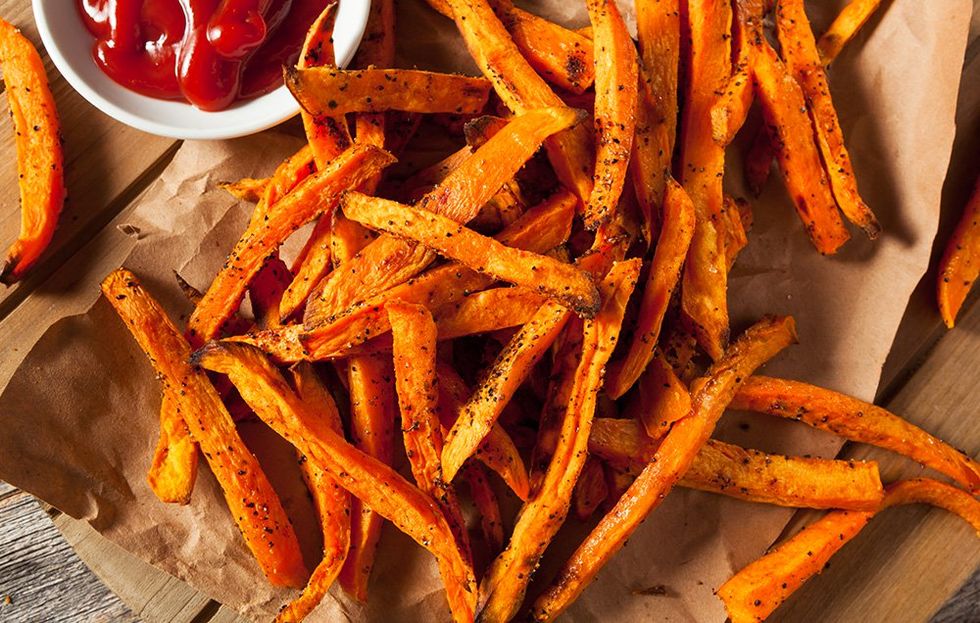You’ve been going to the gym, hitting the weights several days a week. You drag yourself out of bed when it’s still dark out, or you skip happy hour to make sure you get in your workout before the day’s done. Even when you’re not super pumped, you still get your pump on.
Problem is, your body doesn’t seem to be responding—at least, not to the same extent as your buddy, who started lifting with you. He’s already straining the sleeves of his shirt, while your gains are still dormant.
An average beginner lifter can expect to gain two to three pounds of muscle mass a month, and an intermediate lifter one to two pounds per month. But why is your buddy hitting that mark while you’re falling short?
There are lots of reasons why you’re not maxing out your muscle. It’s a lot about knowing your own body. People invest time to learn everything else, but you don’t learn how to take care of and understand your own body.
While there is no one-size-fits-all fix—every body is different, so you respond to workouts and diet differently—there are some main principles to keep in mind: Effort, nutrients, and recovery. Here are seven muscle-building roadblocks that might be squashing your gains—and what you can do to correct them.
You’re not eating enough calories.
If you want to gain muscle—and not just maintain what you have—chances are you need to up the amount of food you’re consuming. That’s especially true if you’re an ectomorph, or a “hard gainer” with a fast metabolism.

If that’s the case, shoot for about 20 calories per pound of bodyweight per day. It’s called a caloric surplus. You need to take in more calories than you burn or its impossible to build muscle because you don’t have the adequate nutrients to sustain growth. And you want to eat often, too.
Part of muscle synthesis is food, so the longer we go without eating, the less likely one will put on mass. Try eating at regular intervals, every four to five hours. Chicken, steak, white rice, and avocado. That’ll help make sure you’re getting your calories from healthy sources—making it less likely you’ll gain on a dirty bulk, where you’d be packing on lots of fat, too.
Related article: 10 Foods That Contains Highest Amount Of Protein To Add To Your Muscle Gaining Diet
You’re not eating the right calories.
Just because you need to up your calories, doesn’t mean you should be downing pizza and junk food. Again, that’s dirty bulking—leading to too much extra fat. You need to eat healthy calories of protein, carbs, and fat.
Protein consumed at regular intervals is the best way to ensure muscle growth. And it’s not enough to just meet protein requirements for each day—ideally you need to evenly divide it over the day. Aim for a minimum of 30 to 40 grams of protein per meal to provide enough leucine to optimize muscle protein synthesis.

Don’t shy away from carbs either—you need them to build muscle. You should aim for a 2:1 carb to protein ratio. Carbohydrate consumption stimulates insulin release which indirectly stimulates growth hormone to build muscle.
Carbs provide your body with energy, too, which you need to put enough effort into your workout to reap the gains you want to achieve. Foods like sweet potatoes, legumes, rice, and other whole grains are good choices.
Related article: Seven Yoga Poses To Do Post-Workout For An Even Better Workout
You’re working out tired.
If you’re a morning workout person, more power to you. This way, your body can be a furnace and burn more throughout the day. But, if mornings aren’t your thing and you’re just phoning in your workouts at 5:00 a.m., you’re not doing yourself any favors. Same goes for the afternoon if you have a jam-packed day beforehand.

If you go into your workout exhausted, chances are your workout won’t be very effective. It’s not an ‘early bird catches the worm’ type of thing. If working out in the morning isn’t working for you, change it.
Because if you’re feeling sluggish and don’t have enough intensity during your strength training sessions, you won’t be able to put in the performance needed to make changes to your body. Instead, find a time that works for you when you have enough energy to get your workout done effectively.
Related article: How To Feel Full And Lose Fat With The Hunger Scale Tips
You’re working out hungry.
You may be used to working out on an empty stomach, but that may need to change if you’re looking to bulk up. Not eating before a workout can affect your strength, speed, and stamina. And that can affect how much you’re putting into your workout.

Plus, working out in a fasted state can physiologically affect muscle growth, too. The absence of fuel before a cardio workout has the potential for the body to use muscle as a fuel source in addition to fat.
Fasting before a strength workout may have a catabolic or muscle breakdown effect which is not what most people are looking for as a result of strength training. So try to have something in your belly before you hit the weights. Choose something with 40 grams of carbs and 20 grams of protein, hitting that 2:1 carb-to-protein ratio.
Related article: The 30-Minute Workout To Increase Overall Strength While Blasting Fat And Calories
You’re too focused on cardio.
While cardiovascular exercise is great to help keep you lean, overdoing it with hour-plus runs or bike rides does have potential to hurt your gains. If it’s making you feel sluggish and not able to put in the performance and intensity needed for your strength training workouts, then it’s too much.
What’s the difference? Think about a person who runs a marathon versus someone who runs the 100-meter dash. The person running long distance is doing cardio and has a frail build, while the sprinter is conditioning and has bigger legs, calves, and arms.

Conditioning helps you build functional muscle, too, so you don’t just look big and like you an do things, but you actually can. So instead of slogging through miles on the treadmill, try sprints or bear crawls instead.
Or 30 minutes on the punching bag doing three-minute rounds with 30 seconds rest in between, or doing squats with a 30-yard farmers walk in between sets. It’s non-traditional means to training the cardiovascular system without having to run for 30 minutes to an hour straight.
Related article: The Best Solutions To Help Prevent Sleep Problems And Aid A Better Sleep
You’re not getting adequate recovery.
The whole “no days off,” “give everything you got, every day, all the time,” isn’t the way to go if you’re hoping to put on muscle. Your body actually grows when you’re resting. You’re in a constant state of breakdown when you’re working out. When you rest, your body is rising up and repairing those muscle fibers a little stronger than they were before.
So while you may be taking one step forward in the gym, you could be taking three steps back if you’re not getting proper rest and recovery. Most guys who aren’t gaining weight or adding muscle can usually chalk it up to one of two things.

One: They’re not training as hard as they think they are; or two: They’re not recovering adequately. You can still be active on your off days—just don’t go crazy. Take the time to focus on mobility and activation circuits.
Set up eight to 10 low-grade mobility or activation exercises and perform them in a circuit fashion, performing three to five rounds. It’s a nice way to still work on ‘stuff’ and also get your heart rate up a bit in the zone two territory, around 120 to 140 beats per minute (BPM), which tends to be the sweet spot for eliciting cardio benefits without being too too taxing on the system as a whole.
Related article: Ditch These 6 Foods And Drink Options Before Your Workout So They Don’t Derail Your Gains
You’re showing up—but that’s about it.
Simply going to the gym isn’t going to cut it. You show up, but then you have to do the damn thing. If you’re skipping out on those last few reps and Instagramming on your phone instead of putting in a solid effort at the gym, you can’t expect to see results.
If you want to gain a certain amount of strength in general, you’re going to have to put yourself in uncomfortable situations. It’s when you’re struggling that those muscles are forced to grow. Every day has to be the hardest workout you’ve ever done, but you do have to put in the work.

Ten percent of the time you’re going to feel like a rock star, and those are the days you should train like a savage. Ten percent of the time you’re going to feel like you got run over by a Mack truck and you’ll need to temper or reduce your load on that day.
As for the rest of the 80 percent? That’s where steady consistency comes in—you’ll need to do the work then. You don’t miss any reps, each one is crisp and fast, and you stay cognizant of progressive overload. These days are the most important.

